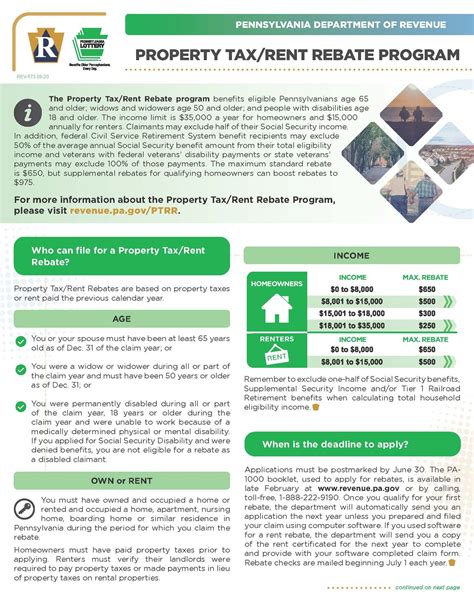Unlocking Savings: How the Property Tax Rent Rebate Program Benefits Homeowners and Renters Alike
The Property Tax Rent Rebate Program is a vital initiative designed to alleviate the financial burdens faced by homeowners and renters alike. In many states, this program allows taxpayers to receive a rebate on property taxes paid, thereby enabling them to keep more money in their pockets. This article delves into how this program works, its benefits for both homeowners and renters, and why it’s essential to take advantage of it.
Understanding the Property Tax Rent Rebate Program
The Property Tax Rent Rebate Program primarily targets low to moderate-income households. It aims to provide relief from property taxes and, in some states, rent payments. Administered by various state departments, the rebate varies depending on income, type of housing, and the property tax amount paid. It’s an essential lifeline for those struggling to afford rising housing costs.
Benefits for Homeowners
For homeowners, the Property Tax Rent Rebate Program serves as a financial cushion. Here are some of the key benefits:
- Financial Relief: Homeowners often face escalating property taxes due to rising property values. The rebate program mitigates this burden by returning a portion of those taxes, which can be used for home improvements, repairs, or everyday expenses.
- Increased Disposable Income: By receiving a rebate, homeowners can free up cash that can be redirected towards savings or investment in their homes or communities.
- Supports Stability: The financial support provided by the program can contribute to more stable housing situations, preventing homeowners from falling into debt or foreclosure.
Benefits for Renters
Renters equally benefit from the Property Tax Rent Rebate Program. Although they don’t pay property taxes directly, many landlords pass these costs along through increased rent. Here’s how renters gain from the program:
- Lower Rent Prices: With the rebate, landlords may be less compelled to increase rent prices, allowing renters to save on monthly payments.
- Direct Rebates: In certain states, renters can receive a direct rebate based on the amount they pay in rent, compensating for the property taxes their landlord pays.
- Greater Affordability: The financial relief that the program provides helps renters contribute to their savings, making it easier to handle living expenses and plan for the future.
Eligibility Criteria
To qualify for the Property Tax Rent Rebate Program, applicants typically must meet certain eligibility criteria. While these requirements can vary by state, common criteria include:
- Income Limits: Many states impose income limits that beneficiaries must meet; those with lower income levels are often prioritized.
- Residency Requirements: Applicants must usually be residents of the state where they apply for a specified period.
- Age and Disability: Some programs may offer special consideration to seniors or individuals with disabilities.
How to Apply
The application process for the Property Tax Rent Rebate Program is generally straightforward:
- Gather Documentation: Applicants need to collect relevant papers, including proof of income, property tax statements, and any required forms.
- Complete Application: Fill out the application accurately, making sure to provide all requested information.
- Submit Your Application: Send your application to the appropriate local or state agency before the deadline.
- Follow Up: It’s advisable to follow up to ensure your application has been received and is being processed.
Importance of Awareness
Awareness of the Property Tax Rent Rebate Program is critical for maximizing its benefits. Many individuals may not realize that they’re eligible to receive funds, which can be a lifeline in managing living expenses. Therefore, community organizations and local governments must work together to spread the word through workshops, mailings, and social media campaigns.
Conclusion
The Property Tax Rent Rebate Program serves as a crucial mechanism for providing financial relief to both homeowners and renters. By understanding how the program works and its eligibility criteria, individuals can unlock significant savings, ease their financial burdens, and foster greater economic security. For anyone involved with housing—be it residing in a rental unit or owning a home—taking advantage of this program can lead to transformative financial benefits.
FAQs
1. Who is eligible for the Property Tax Rent Rebate Program?
Eligibility typically includes low to moderate-income households, residents of the state for a specified period, and may include seniors or individuals with disabilities in some states.
2. How do I apply for the program?
To apply, gather the necessary documentation, complete the application form, and submit it to the relevant agency before the deadline. Always follow up to confirm receipt.
3. How much can I expect to receive in rebates?
The rebate amount varies widely and depends on factors like your property taxes, your income, and the specific guidelines of your state program. Check with your local agency for exact figures.
4. Do I have to repay the rebate?
No, the rebate is considered a grant and does not need to be repaid.
5. What should I do if my application is denied?
If your application is denied, you have the right to appeal the decision. Contact the agency that processed your application for their appeal process and next steps.
This HTML format presents a comprehensive article on the Property Tax Rent Rebate Program while ensuring readability for web publication. The structure enhances user experience and provides potential readers with valuable insights into the topic.
Download Property Tax Rent Rebate Program
